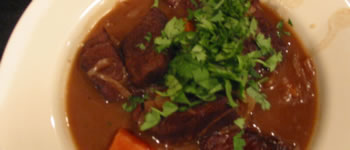Of Cheese Sandwiches
This morning for breakfast, I made myself some coffee (Sumatran dark roast, fresh ground), squeezed a glass of fresh orange juice, and made a couple of slices of french toast (whole wheat bread, a free-range, organic brown egg, Madagascar vanilla) with real maple syrup.
That's kind of unusual: I used to skip breakfast entirely, and then for years I was a coffee-and-donut kind of fellow. Partly, the Tuesday morning breakfast follies are just another chance to play with the new kitchen. Partly, the new kitchen means it doesn't really take much time — especially with the nice new nonstick pan Linda bought me after the year of the hot plates.
But there's also something in the air, in the spirit of the age: a lot of people are paying a lot more attention to food. I know one software guy, for example, who spends days evaluating whether his company really, really needs to spend $100 on a software package, but give him a chance to go to the French Laundry and he's jumping into the car and heading to Napa. The engineers at Linda's software outfit unwind with Friday afternoon extravaganzas of hors d'oeuvres and baking and wine tasting. Meg Hourihan, the blogger co-founder, gets a new job as a cook. There's a lot of eating going on.
Adam Gopnik has a nice column in this week's New Yorker about food writers. (You've got to hand it to Remnick: the New Yorker once again has a knack for running articles on unusual topics that happen to be exactly what you've been thinking about that week)
There are two schools of good writing about food: the mock epic and the mystical microcosmic. The mock epic (A. J. Liebling Calvin Trillin, the French writer Robert Courtine, and any good restaurant critic) is essentially comic and treats the small ambitions of the greedy eater as though they were big and noble, spoofing the idea of the heroic while raising the minor subject to at least temporary greatness. The mystical microcosmic, of which Elizabeth David and M. F. K. Fisher are the masters, is essentially poetic, and turn every remembered recipe into a meditation on hunger and the transience of its fulfillment
The two styles can’t be mixed. If we are reading, say, about Liebling’s quest for the secret of how rascasse are used in bouillabaisse, we don’t want to be stopped to consider the melancholy lives of the remote fishermen who seek them out. And if we are reading David’s or Fisher’s sad thoughts on the love that got away on the plate that time forgot, we would hate to find, on the next page, the writer handing out peppy stars in modish kitchens.
"Sad thoughts on the love that got away on the plate that time forgot." Wow.

Why are we eating so much? Why do we write about these cheese sandwiches?
Perhaps because we're paying attention. We've outgrown the sensational thrill-a-minute goldrush of the first net boom. We've outstayed the depressing gloom of the aftermath. Now, we're listening and we're tasting and we're thinking.